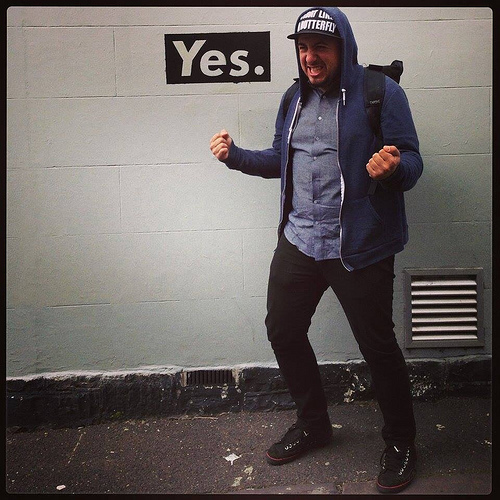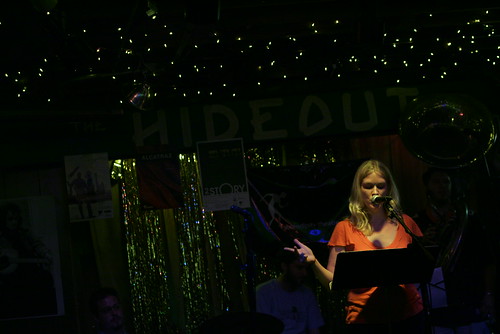
Faculty Spotlight: Megan Stielstra and Bobby Biedrzycki

I met up with Megan Stielstra and Bobby Biedrzycki the other day to speak about their course, “Story and Performance.” I took this course my first semester at the school, and I’ve found it informs my writing and subject matter daily, whether I’m writing to perform or not. After catching up some—Bobby and I just performed in a show with 2nd Story and Megan has been helping me with my C.V.—we had a conversation for Marginalia about “Story and Performance,” a course we all feel is essential to students in the Fiction Program.
Can you tell me about the genesis of Story and Performance? How did it come to be?
Megan: Being a graduate of the CRW program and immediately going from that creative community to the one at 2nd Story, the idea of performance became integral to my personal development as a writer and an educator and a human being. So much of my writing process is tangled in this really lovely way with performance technique, whether we’re talking about reading out loud or having an understanding of how facial expression and voice and volume and gesture kind of influence the text—all these things were really connected to the work I was doing, and I wanted to figure out a way to bring that to our students in the department, so this class was born out of that.
Bobby: Another factor, it can’t be denied that the emerging and already here live lit and storytelling scene in Chicago—this is kind of a necessary thing; it’s a place where students have these opportunities and can become part of the community. If we’re going to have a cutting-edge writing program where we offer students the ability to have these opportunities, and to play around and experiment with certain types of art—it’s all going on in this city and things like the Paper Machete and Write Club and 2nd Story has to be acknowledged in the curriculum. That’s a thing we really wanted to do—show students those form.
What are some key components of the curriculum? I know it’s changed. When I took the class three years ago, it was just Megan teaching, and then Bobby came and hung out and facilitated lessons, and now it’s co-taught.
Megan: Bobby and I co-teach with 2nd Story and in many educational opportunities around the city. Having more than one teacher in the room with personal narrative storytelling—it can get so personal so quickly, and the participants in the room are so profoundly brave and completely blow my mind with where they are willing to go with their work—they’re completely inspirational—but when you’re facilitating that kind of thing, to have someone co-facilitate in the room is vital. Let’s say a participant in the room tells a story that touches a nerve in some way, to be able to tag out and say, “So-and-so and I are going to hop out to the hall and talk about this—can you continue the lesson?” It also allows for one of us to facilitate the activity and the other to participate with the rest of the students and storytellers in the class. bell hooks writes about how if you’re going to ask your students to be vulnerable, you also need to be vulnerable in return, and it is really difficult with that kind of material to be able to facilitate and share simultaneously, so I think it allows us to volley that kind of material. Did I just…?
Bobby: Yeah, you hit it.

Photo credit Julie Sadowski
Megan: Back to how the curriculum has changed: as a teacher, I think the curriculum should always evolve based on the participants in the room and their needs. It takes a few weeks to see who these people are with whom we are lucky enough to work and where are they and at what level of craft are they operating, and performance technique and personal narrative—what are their interest levels? How can we craft the class and bring in models of writing and performance and performance poetry and prose and full-length plays sometimes that best suits their needs in terms of voice and their artistic craft?
Bobby: It also probably evolves with the world out there. If there are new forms of writing and performance that are popping up out there, if there’s a new series or something that’s gaining traction in the artistic world out there, it should inform our curriculum (and it does).
Megan: What’s so exciting about teaching this class here is that there is so much in Chicago to pull from. In this past session, we did 2nd Story, which is personal-narrative-based work; Paper Machete, which is expository-based work; and Write Club, which is persuasive. There, you have three forms of writing. And then we did Ignite Talks as well, and other things, but those are the four forms we looked at specifically.
What do you do in terms of reading? Or is it more listening to stories, going to performances? How do you do it in this class?
Megan: We do all of that. We ran the class through a closed Facebook group last time, because so much of the literary community operates through social media. We could tag shows through this page.
Bobby: YouTube clips.
Megan: YouTube clips! We could tag performance poetry and readings. At the beginning, it was just Bobby and I throwing these things up, but by the end, it was everyone throwing them up. In fact, in class, we would have the Facebook page open during class. If certain conversations began in class that we wouldn’t be able to finish the way we’d wanted to in class, we’d have somebody run up and post it to the page and we’d continue the discussion after class. It let Bobby and I tag in additional readings or that kind of thing. The biggest decision became clarifying what went up on that page that was required and which was put up there that we though connected to the conversation. What I find cool is that page is still alive and active—students are still writing on it and connecting and sharing. I love that the community is continuing.
Can I say one thing that is cool about the class? So many of the students that have taken it have leapt into sort of these professional opportunities of performance or of teaching writing and performance. So many of the students end up working with 2nd Story and with different performance organizations in the city, and I’m so glad to see that work live outside of the classroom. It’s exciting when everyone in the class realizes this isn’t homework—this is your work.
Bobby: I feel like the rather archaic or romantic idea of the writer in solitude—the very real thing that the process of writing is very solitary—but that is rarely how we work in the world now as writers. Unless we are lucky enough to just only write books, we are constantly working in communities. So, I think there is a large community component to the class that is just about ensemble building and community building. It’s like a theatre—a cast of people that come together and work together to put on a show. That’s a bit of what we are trying to do—to give folks the opportunity to do that and to create art. Here’s what it feels like to be part of a community and to build together as an ensemble. We use theatre techniques to help build an ensemble and a classroom as a community. There is a multiplicity of ways that this might pop up and inform someone on their work life after this class.
Megan: Like a team—like a writer’s room. Like T.V. writers.
Bobby: Yeah! So much of my work and my writing is not rooted in solitude—it’s rooted in being in part of a team or community that is building something together. Those skills, how do we lift others up on that community and still have your voice heard is what we are trying to drive at in the course.
(We went on to talk about the conferences and schools Megan and Bobby have been invited to in the past and some that are upcoming about this work and this process and how story and performance can drive one’s own writing forward among other topics.)
Megan: I’m just so proud that this work calls its home-base here at Columbia and is offered first-and-foremost to our students.
Bobby: The idea of a Story and Performance class is unique to Columbia. I don’t know of another college or university that offers it. I’m actually in conversations with DePaul about having this in their theatre department. It’s interesting just how many itches this thing—this class—can scratch.
(We talked a bit longer about global implications of classes like this—last summer, Bobby taught storytelling and performance as part of his activism work in Australia—and realized we could have talked for hours on this. These two friends that met at Columbia and have worked together since have developed an innovative class that I feel is the best class I took at Columbia.)
